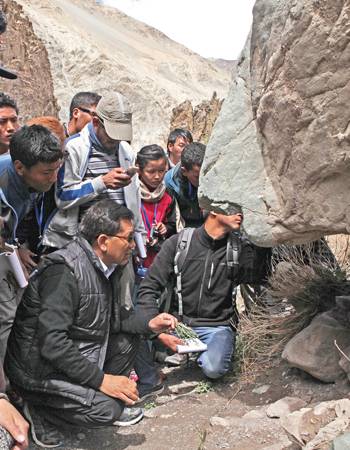Jigmet Takpa, IFS
Wildlife Service Award (2016)
Jigmet Takpa, IFS More than a decade ago, I had my first opportunity to visit Ladakh, the land of Lamas, snow leopards, urials and Black-necked Cranes. On that trip, I met Jigmet Takpa, a fine Indian Forest Service (IFS) officer from the 1990 batch, who had grown up in Ladakh as a native, and used his experience to develop programmes that ensured engagement between local communities, scientists and government. At that time he was coordinating the preparation of a roadmap for the progress of the Ladakh region with the Ladakh Autonomous Hill Development Council – the Ladakh Vision Document 2025. Since then I have followed his work and found him to be inspirational. Conservation programmes must essentially work closely with local communities, and Mr. Takpa has done this with great skill. Economic losses caused by human-wildlife conflict often erode the reverence of species and deplete tolerance towards conservation in general. Mr. Takpa’s work on innovative conflict resolution programmes that reduce monetary losses and improve tolerance of the communities, and efforts to improve their livelihoods through alternatives such as ecotourism has borne great results. Today, community members acknowledge the important role of the snow leopard, the apex predator of the Asian mountain ecosystem, as a barometer of the health of the ecosystem it thrives in, and as a cultural mascot of wildlife in the mountains. Other critical needs such as energy security through renewable sources is also improving the overall welfare of the people. Over the years, innovative, integrated conservation models in the snow leopard landscape being implemented under his leadership have been widely acclaimed and lauded for not only reducing human-wildlife conflict but also for building a constituency for wildlife conservation. Mr. Takpa has played important roles in several initiatives within Ladakh. From drafting management plans for the Hemis National Park to designing micro-level planning of the Changthang region and scaling up schemes of ecotourism through home-stays, eco-guides and camping and waste management projects, Mr. Takpa has several feathers in his cap.
Takpaji, as he is fondly known among his peers and colleagues, continues to play an important role in shaping the wildlife conservation, ecotourism and development landscape of Ladakh. His role in developing MoEFCC’s flagship programme for high altitude conservation – Project Snow Leopard, has been pivotal. He also serves on the Jammu and Kashmir State’s Biodiversity Board, and is the Director of the Ladakh Renewable Energy Development Agency apart from being the Chief Conservator of Forest (Wildlife), Ladakh.
– By Koustubh Sharma, Senior Regional Ecologist, Snow Leopard Trust


